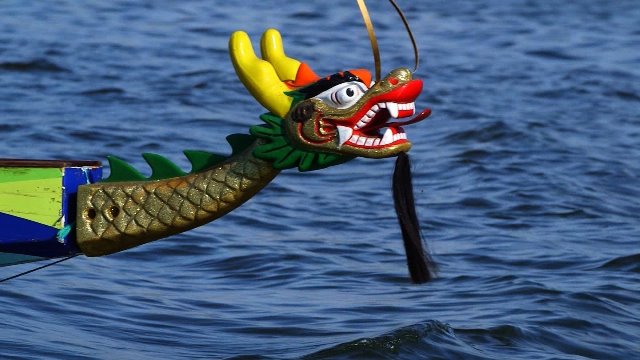Dozens of people showed up at a lake in Orlando to ride the dragon on a recent Saturday morning.
The crowd came from all walks of life. But they soon would be working in unison to paddle their boat across the water.
Dragon boating is an ancient Chinese sport that began more than 2,000 years ago.
But today it’s drawing thousands of Americans away from their smartphones and couches to get fit and feel a sense of camaraderie.
There are dragon boat clubs in dozens of US cities from Baltimore to Atlanta to Reno, Nevada.
A dragon boat is long (40 feet) and narrow (two paddlers across), which allows it to go very fast when everyone is in synch.
On race days, the boats sport colorful carved dragon heads and tails.
“This has grown like a mushroom in Orlando,” says Andrea Eliscu, founder of the Orlando Dragon Boat Club.
“You get people to give up of themselves for the purpose of trying to be a teammate,” Eliscu says.
Melissa Romero is a customer sales and service agent at a resin company. It’s a stressful job, but she finds relief in dragon boating.
“It’s great for the heart rate because you’re able to get that pumping and really move.”
“The worries of the day just kind of melt away and you’re thinking about being on the boat and contributing to the team. What’s really nice about this sport, you don’t have to be 100% in shape. I love being out in the open rather than being in a gym,” Romero says.
She’s been doing it for five years, racing throughout the year.
“I put together our team. We travel around Florida to race against teams from in state and out of state.”
Romero says with dragon boating, the technique to help you move the water away from the boat is different from your general canoe stroke.
“When I first started I couldn’t paddle more than five minutes at a time. Now I can probably do an hour continuous,” Romero says with pride.
Retired Orlando police officer Willis Weaver savors being out on the water, in the elements and making new friends.
“A lot of times cops are in a closed society. You don’t deal with a lot of people who aren’t cops. So you come out here and you have people working in whatever jobs they work in. When you’re out there it doesn’t matter what you do. All that matters is that you get your stroke count right.”
Weaver is also a colon cancer survivor who is working to stay healthy.
“The water smells good, it feels good even if it splashes up on you. It’s kind of like a zen moment.”
“A lot of people who have never done this before are really becoming competitive and putting a name out there for the sport,” says Romero.
